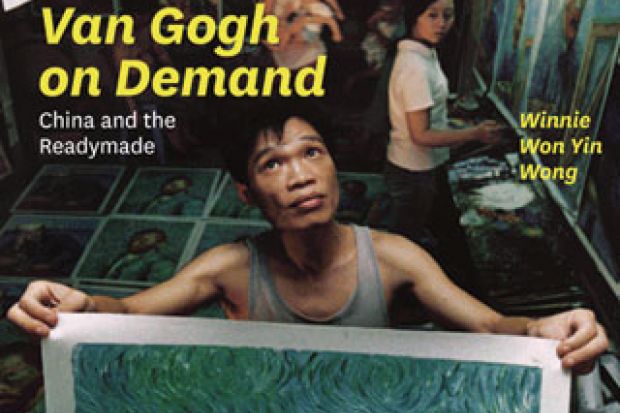Dafen Oil Painting Village in southern China, as Winnie Won Yin Wong’s fascinating study points out, is not a village at all but instead the world’s largest production centre for handmade oil paintings, many based on masterpieces by Van Gogh, Monet and other Western artists. Drawing on a wealth of interviews and her own experiences as embedded researcher and Dafen painting apprentice, Wong considers the questions of authorship and creativity that are raised by a place where 8,000 painters, working with great skill and speed, produce 5 million paintings a year. One of the painters she meets, Zhao Xiaoyong, can draft the composition for Van Gogh’s Sunflowers in less than 2 minutes and 30 seconds. Dafen paintings are not exact replicas: “Mona Lisas…are almost always larger, Starry Nights always thicker, David’s Napoleon smiles more, and Yue Minjun’s pink faces smile less cynically.”
Wong sets about myth-busting with relish, including ideas of the West as precedent and the East as follower, Dafen as painting sweatshop, and value-laden notions of copying. She incisively examines intermediaries, art schools and the market. Her book is crammed with acute insights on creative industries, bohemia, cultural diplomacy, the agency of the translator and intellectual property as she unpacks the boundaries between art, craft and industry.
She uncovers the facile ironies and exploitation involved in contemporary “site-specific work translating between peripheries and centers for biennales, triennales and expos”, and does not pull any punches in describing projects carried out by Dafen workers for international artists including Liu Ding, Sascha Pohle, Christian Jankowski and Michael Wolf. Her research highlights the absurdities thrown up by the collision of the West and China in a process of breakneck development in the first decade of this century.
Some of the interesting questions she raises could have been pursued further. Who, for instance, constitutes the market for Dafen’s paintings? There are passing references to Kmart, Walmart, J. C. Penney, Target, Amsterdam street vendors and interior decor wholesalers. Discount art retailers and their clientele raise complex questions around this type of consumption of art, which she too easily conflates with “the art market”.
However, in weighing what Dafen may have to say about the thorny questions of what is art and what is an artist, Wong creates stereotypes of her own. The Aunt Sally of Western notions of art and artists that she sets up and attacks throughout Van Gogh on Demand is too simplistic. She equates the Western conception of art with self-expression only, which has never been the case. Can there possibly be such a thing in art as “just skill”? Where do the source images that Dafen painters copy or adapt come from in the first place? Looking at the world - both the visible environments and the invisible socio-political and ideological environments - and thinking and making using those perceptions, are essential skills for any artist. The performance of making art is only a third of the process, which begins with looking through the filter of the artist’s situated subjectivity, and ends with looking at what is manifested and received by audiences. Wong raises many important questions about art, and although some of her answers are stronger than others, this book is still essential, provocative reading for aspiring and practising painters and art teachers.
Van Gogh on Demand: China and the Readymade
By Winnie Won Yin Wong
University of Chicago Press, 320pp, £66.50 and £24.50
ISBN 9780226024752, 4899 and 4929 (e-book)
Published 21 April 2014
Register to continue
Why register?
- Registration is free and only takes a moment
- Once registered, you can read 3 articles a month
- Sign up for our newsletter
Subscribe
Or subscribe for unlimited access to:
- Unlimited access to news, views, insights & reviews
- Digital editions
- Digital access to THE’s university and college rankings analysis
Already registered or a current subscriber? Login





